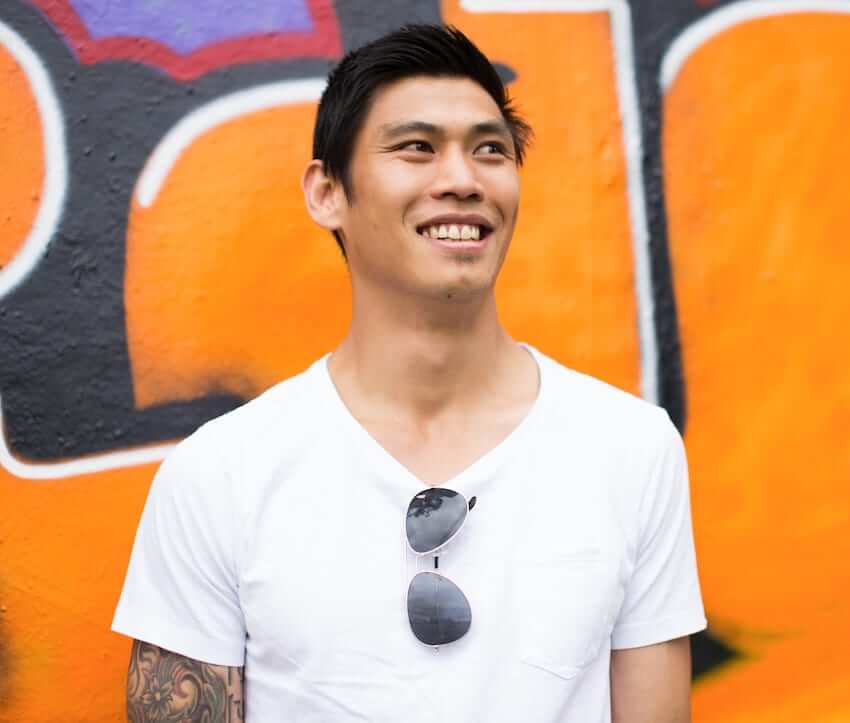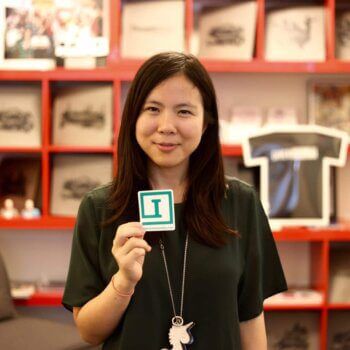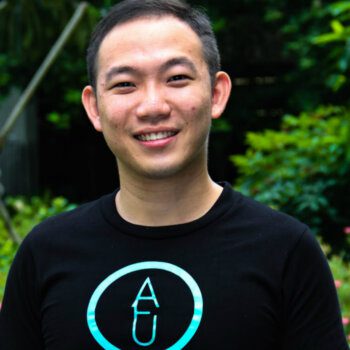Thai Nguyen is the founder of The Utopian Life, a launchpad for personal revolutions. Together with featured interviews, it’s a place where people can be exposed to others who’ve stepped out and pursued their dreams. Inspired by the words of Robin Williams, “No matter what people tell you, words and ideas can change the world.” The power of words to evoke positive change is a foundational statement for The Utopian Life.
Born in Vietnam, Thai’s family fled the country after the war to a refugee camp in Indonesia. They made it to Australia where he grew up. Like many entrepreneurs, Thai struggled to fit into the mould and figure out what he wanted to do with life. As soon as he finished high-school, Thai spent a year travelling and playing Rugby for Nova Scotia, Canada, and also working in a bakery in San Francisco.
When Thai returned to Australia, he completed an apprenticeship as a Chef for the Hilton Hotel, later owning a small cafe with his parents. At the same time, Thai was training in Muay Thai (kickboxing), and after a couple of amateur fights in Australia, he had the opportunity to move to Thailand with one of Australia’s best fighters and pursue a professional career.
While in Thailand Thai met a professor from Texas and he invited him to complete a BA degree as his school. Thai then moved over to the States and completed my Bachelor of Humanities degree there. During that time, he went through what he calls an “early mid-life crises.” For some strange reason, Thai began to think deeply about death—asking himself the question, “If I were to die today, would I be happy with what I was doing in life?” The answer was “No.” The reason being deep down inside, Thai always dreamt of being his own boss, to take something he was passionate about and build a lifestyle around that. Thai got himself a Macbook, a backpack, and moved to Cusco, Peru—living his dream of being a location-independent writer/entrepreneur.
“Success leaves clues, my goals is to gather and share these clues”
Why Utopian Life?
I was encountering a profound number of people who approached life and work with an attitude of—this is what I HAVE to do rather than what I GET to do. I thought, how difficult is it really to create a lifestyle around doing what you love? I began reaching out to people who were living their dream, living their utopian life, and having great conversations with them. I thought, man, I need to share this content with others. So I started recording the interviews and sharing them.
Could you walk us through the process of starting up The Utopian Life?
I’d been listening to Entrepreneur On Fire from the very beginning, and reached out to one of the guests, Kimanzi Constable. He’d transformed his life from a bread delivery guy to a best-selling author. We connected and he coached me through the whole process of setting up a website and getting initial traffic.
A lot of time was spent looking at leaders in the field—but I didn’t simply want to imitate what they were doing, I was looking for things they weren’t doing. Asking myself, what can I contribute to the industry?
While it’s good to model and mirror some of the effective strategies of others, the last thing I wanted was to end up being a poor imitation.
So first, I searched for a pain-point in the industry. While there was a lot of information and exposure for well established lifestyle & business entrepreneurs, I found many people were intimidated by the ‘big-guns’ that were always featured. I wanted to highlight the ordinary, everyday folks who were chasing their dreams and unpacking the basic baby-steps they took to get unstuck.
Then came thinking up a brand name, creating an avatar—identifying my specific audience, finding a good website hosting company, buying a domain name, designing a webpage and looking through different themes.
There was a lot of initial networking to try find suitable guests to interview. And identifying different websites to guest-post for.
It helped being very specific and having not only clear weekly, but daily goals. I created a vision for where I wanted to be at the end of the week, and made sure I was knocking out the daily tasks that would get me there.
Did you encounter any particular difficulties during startup and if so, how did you guys overcome it?
Yeah, I went through a domain name change and re-branding the site. I realised that I wanted to appeal to a broader audience. Even though I had built a solid foundation and would drop in my page rankings, it was still early enough to make a significant change without too much drama.
I think any time a company decides to make significant change, you risk damaging or losing some of the work you’ve already done. But it’s all about looking at the long term and assessing whether the outcome outweighs the potential loss.
How have you been developing The Utopian Life since startup (i.e. what’s the developmental direction) ?
A ton of guest writing to get the brand and my name in front of large audiences. So targeting any sites with 200K+ likes on Facebook, and using SEO page analyses tools. I spend a lot of time networking, reaching out to people on Linkedin and emailing featured entrepreneurs I listened to on different podcasts.
Personally getting featured as a guest on podcasts has been really helpful for establishing credibility in the industry.
The developmental direction for The Utopian Life is exciting, I’ve recently partnered up with an APP company aiming to revolutionise the industry and make personal development specifically tailored to individuals. So we’ll be drawing from technologies such as Javascript, 1-pixel beacons, and Iframes, and using that information to deliver you the most relevant content to your needs, based not only on what you request, but also on what your online activity and behaviour tells us.
What kind of feedback did you get for The Utopian Life so far?
Initially I really worked hard on gathering interviews and I got great feedback from that. Especially with the growing success of John Lee Dumas, to be able to sit down with him in his living room was great boost for my credibility. I know the founder of The Asian Entrepreneur Magazine was also a guest on John’s show, so you know it’s a great podcast!
I’m always striving to provide a different light on issues, people have appreciated that. And just simply taking action—people get motivated when they see someone chasing after their dream.
Do you face a lot of competition in this industry? What is your strategy against your competition?
Absolutely. The personal development space is quite saturated. I knew that coming into the game. On one hand it’s a good thing because you know there’s a need for it. On the other hand it’s easy to become a tiny fish in a giant pond.
I think for every industry, your approach before launching is just as important, if not more, than after launching. Two things: being realistic, and gaining validation. Do you have the skill set needed to succeed? If the answer is no, that doesn’t mean your dream is crushed, it just means that you need to delay your launch and work on gaining the skills you need to succeed.
When do you know it’s the right time? —When you get validation. I had only recorded one interview and written one article when one of my guest articles got picked up by a large website. That’s when I knew I had something to contribute, that people would listen. So I dropped everything else I was doing, put my head down, and hustled.
Strategy against competition? One of my favourite quotes is: “Be so good they can’t ignore you.” Setting the bar higher and higher, trying to turn good into great. I always look at what issues are currently floating around, what ideas are being discussed? What new books are being written? And then trying to contribute something unique.
What can you tell us about the industry? Have you developed any industry insights that you could share?
The biggest challenge is the tension between trying to shape the industry and being shaped by the industry. When do you give your audience what they want, and when do you give what they need? When to listen to your audience, and when you think your audience should listen to you?
You’re always trying to look ahead and predict trends, seeing things that your audience can’t see. Sometimes you’re spot on, and sometimes you fail. Every successful company has a history of bombed products; The difference between the ones that survive the bombs, and the ones that have their ship sunk is carefully maintaining that balance. And having a strong foundation to fall back on, which comes from having history of trust built through consistently getting it right with what your audience wants.
I’d say the balance is 70% Wants & 30% Needs. The more you get it right with what your audience wants, the more you can be adventurous and pioneering with something they need, and subsequently producing something groundbreaking in your industry.
That’s when you strike gold, when you’re able to provide your audience something they had no idea they needed or wanted.
Another big lesson has been dependency on social media, I know some businesses have suffered terribly with the recent algorithm changes to Facebook, and their news feed being dominated with sponsored sites. So trying to identify what is the shortest, fastest, solid connection you’re able to have with your audience. That’s one reason email-lists are treated as sacred, your mailbox is unlikely to be subject to any external changes.
How do you plan to stay relevant in this industry?
Maintaining that “Wants vs Needs” balance—provide the industry with everything that they want, but also producing new ideas, new work that uncovers what the industry needs.
It takes both a bottom–up approach, and a top–down approach. Taking the role of soldier, and sergeant. It’s only when you’re in the trenches that you know what is being discussed, but it’s only when you step outside that you’re able to have a broader view.
It’s important to note that staying relevant at times means to step beyond the industry and be ‘irrelevant.’ I look at trends in completely different industries. People are people at the end of the day, there aren’t too many variances in human behaviour.
What is the future of the industry in your opinion?
We follow in the footsteps of technology. The way any industry manages to leverage and utilise technology will be linked with their future success. In my line of work, it’s all about how we distribute and consume information and ideas.
The internet is becoming more and more customised for individuals. Google tracks everything you do online—this is exactly what I was saying before about knowing what people want and need long before they realise.
The most successful in the industry will be those able to make knowledge the most relevant to the individual. The specific timing for imparting content will also be crucial. Not just what content is given, but also when.
Personally, I’m fascinated with the blurred lines between neuroscience and technology. The possibility of Matrix-style knowledge uploading is becoming more and more of a reality. A potentially frightening bridge, but we’ll cross that bridge if we get to it.
Were there anything that disappointed you initially?
Haha, having to be patient! Entrepreneurs are always living 10-years in the future. But we all know there’s no short-cut to success. I guess it wasn’t as much of a disappointment rather than a sobering reality.
The importance of marketing was somewhat of a disappointment/frustration. Realising that producing something of great quality was only part of the job, the other part was to get it exposure and get it in front of people. The necessary strategy can sometimes be detracting from the work.
What do you think about being an entrepreneur in Asia? Is it harder or easier, why?
The idea of the “New Asian Capitalists” reflects the different landscape doing business has taken in Asia. The roots of entrepreneurship are certainly not as deep as in other parts of the world—which makes it a very exciting time to launch regardless of what industry you’re in. I don’t think anything worthwhile will be easy, the earlier you start however, the more opportunity you’ll have.
The reason being that previously there was a huge dependency on foreign trade and relationships from Asia. But the unique economic and industrial booms across Asia have turned things more introspective. Asian entrepreneurship is moving away from traditional being an internationally reliant venture to a healthy intra-national venture, building off the internal economy of a nation.
What is your opinion on Asian entrepreneurship vs Western entrepreneurship?
I love this question because I got to enjoy the best of both worlds—born in Vietnam but growing up in Australia. I do believe historically the Eastern and Western minds have been shaped through very ancient and distinct thinking patterns, and it played out in business.
But today, with the world becoming more connected, the lines are getting very blurry. There is so much interaction between Eastern and Western business philosophies that it’s hard to figure out where one ends and the other begins.
CNBC has an impressive list of “Asia’s Richest Entrepreneurs,” INC also has a list of “Top Asian Entrepreneurs,” regardless of whether these individuals are based solely in Asia or in a Western country, it’s almost impossible to spot differences when compared with purely Western entrepreneurs. Their models of leadership, the services they provide, are “six-in-one, and half-a-dozen in the other.” For every Asian founder/CEO, there is a parallel Western founder/CEO.
What is your definition of success?
Starting with an impossible vision, and working it into reality.
Why did you decide to become an entrepreneur?
Not to sound all ethereal and existential, but it made me feel human. Because it meant having ownership over my life. I can go to bed frustrated because of bad decision I made, what I couldn’t bear was going to bed frustrated because of decisions someone else made for my life.
What do you think are the most important things entrepreneurs should keep in mind?
It so cliché, but the truth is undeniable—that it’s a marathon and not a sprint. Like any diet that promises you’ll drop half your weight, it’s just not healthy nor sustainable. Put off the immediate gratification for the long-term reward.
Also, it’s ok to ask for help. Entrepreneurs are naturally ambitious and wake-up wearing a cape. But that can put up giant walls blocking the specific people and assistance that could take your business to the next level.
In your opinion, what are the keys to entrepreneurial success?
Learning from criticism. Looking beyond your bruised ego at the possible truth. Sometimes criticism is just shallow and childish, but other times it highlights an area that we were completely blind to.
Grinding through the mundane. The big wins and celebrations are birthed out of a ton of blood, sweat, and tears.
Any parting words of wisdom for entrepreneurs out there?
For budding entrepreneurs or anyone hesitant about launching and chasing after your dream, I’d challenge you to think about the same question that sparked my journey: “If you were to die today, would you be happy with the life you’re living?”
For established entrepreneurs, take the time to respond to those who reach out to you. Even if you can’t give them what they’re asking for, the fact that you responded will motivate them more than they, or you realize.
Connect with Thai Nguyen
Website: www.TheUtopianLife.com
LinkedIn: https://www.linkedin.com/in/thainguyen84
Facebook: www.facebook.com/TheUtopianLife





























